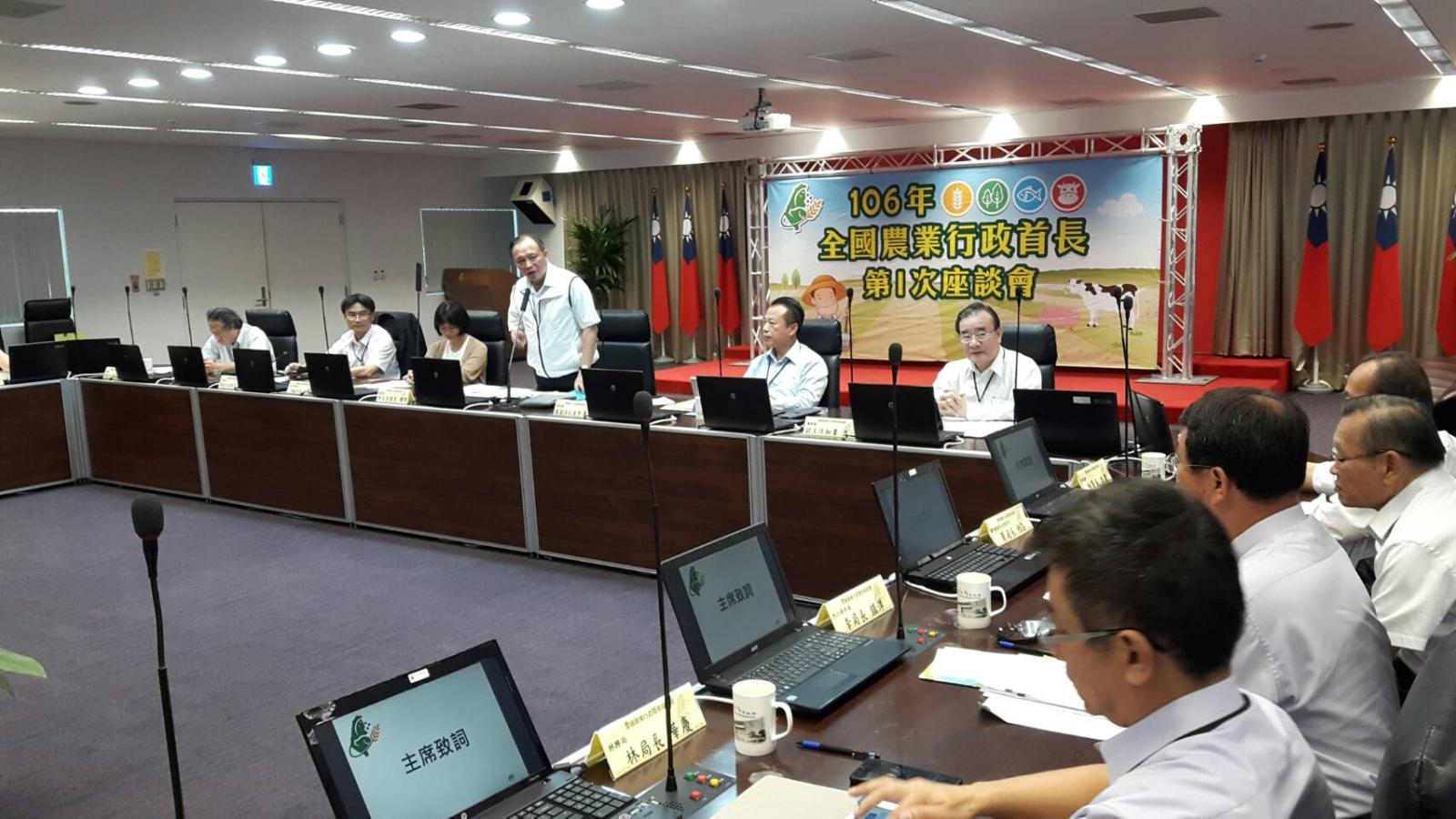News
Agricultural Chief Executives Gathered in Taichung to Exchange Ideas about the Future of the Industry
In order to strengthen the partnership between central and local agricultural agencies, the Council of Agriculture (COA) held the first edition of 2017 National Agricultural Chief Executives Seminar on June 23, inviting municipal, city and county government administrative chief executives to participate in the event. COA Minister Lin Tsung-hsien congratulated Taichung City Government for obtaining the right to host the 2018 Taichung World Flora Exposition, and also praised each county's effort in preventing and containing the H5N6 avian flu. He then expressed his gratitude to the hardworking frontline quarantine and disease prevention officials. As for the government's new agricultural innovation program actively promoted by the COA, the Council hoped that local governments can give their full support in order to boost agricultural modernization, create new agricultural value, secure farmers' welfare and profit, while ensuring resource recycling and sustainable ecology for an innovative agriculture.
Expand the trial of both Direct Payment Policy and Guaranteed Purchase Price Policy for rice from the second cropping season in 2017
In order to encourage farmers to produce high quality rice and reduce the dependence on guaranteed purchase price policy, the COA made the commitment to continue promoting the trial of both direct payment policy and guaranteed purchase price policy, which is expected to expand to 50 townships, towns, cities, and districts from the second cropping season in 2017. The parallel system would offer a new option to quality rice producers after it becomes integrated with environmental payments and is officially implemented in 2018. In the seminar, the Taichung City Government shared its implementation experience on the seminar, while New Taipei City Government stated its intention to adopt trial environmental payment policy. Minister Lin thus expressed his hopes that the implementation of said policies would increase farmers' profits.
To enforce the Five Links of Food Safety Policy, the COA continues to encourage schools to use 4-labels-1-Q (GAP, CAS, CAS Organic, TAP, and QR-code) ingredients for school lunches
In order to ensure safe supply and management of school lunch ingredients as well as improve food safety for students, the COA cooperated with health and education authorities to promote school lunch that uses low carbon footprint local ingredients. Furthermore, food ingredient inspections are carried out through inter-ministerial cooperation, which may be random (carried out by authorities) or voluntary (submitted by food ingredient suppliers and catering businesses) this year. Since the “usage of 4-labels-1-Q ingredients in school lunches” policy would be expanded to all cities and counties nationwide in September, the Council suggests municipal, city and county governments to take the experience of Hsinchu City Government as reference, communicate actively with catering services and reach a consensus with schools to comply with the policy.
The establishment of Taiwan International Agricultural Development Co., Ltd. puts farmers' benefits in first place and rebuilds export-oriented supply chain of agricultural products
For the purpose of grasping export opportunities and solve the problem of unstable fresh agricultural products export supply chain, the COA provided counseling for the establishment of Taiwan International Agricultural Development Co., Ltd. at the end of 2016, focusing on banana, pineapple and atemoya as main products for export to Japan and other new emerging markets. The Council has planned to explain the issue of contractual farming to farmers and farmers' groups in major production cities and counties from July to September, 2017. Furthermore, it would work with experienced export farmers in training aspiring new or young farmers to join the export production supply chain. This model of professional farmers leading new comers is essential in expanding agricultural labor force. COA Deputy Minister Chen Chi-chung explained in the seminar that in order to relieve the pressure from price decline due to recent banana over-production, Taiwan International Agricultural Development Co., Ltd. has been actively negotiating export to other countries so as to protect farmers' interests and engage in talks with several large international enterprises for further cooperation. In the future, orders can be customized according to each country’s demands. There would be regulated production to improve the quality and stable supply of agricultural products for export aimed at the emerging markets.
The COA would immediately process all participants’ advices and conclusions
Minister Lin stated that the seminar not only gathered constructive suggestions to national agricultural policy from local governments but also generated policies that suit local needs, which in turn provided solution to common problems. Regarding the suggestions proposed by city and county governments, Lin instructed to list them as reference for future policy planning, and urged relevant authorities to deal with the issue promptly. In the future, the Council would enhance the communication and interaction with all municipal, city and county agricultural chief executives, making agricultural policies more suited to the demand of local communities and solve agricultural issues. He hopes that all agricultural administrative agencies could work as one to achieve sustainable development and create new opportunities for Taiwan’s agriculture.

